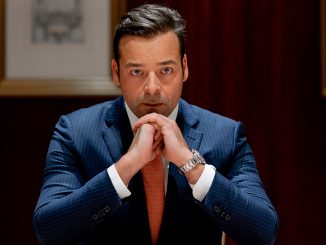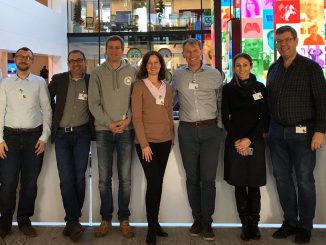
Many people and animals in Arctic regions have very high levels of persistent organic pollutants in their body fat. Pollutants from industries in Europe, Asia and North America are transported by wind and water to the Arctic, and there enter the local food chain. Through cumulative ingestion along the food chain, these compounds are “biomagnified”, and then eaten by people[i]. So people who live in what many would consider an almost pristine environment, seemingly untouched by modern human existence, have some of the highest levels of industrial pollutants in their bodies[ii].
We live in an era of extraordinary inter-dependence that calls for extraordinary transnational government-business-and-civic-society cooperation. In this epoch of “hyper-risk”, global economic, environmental, financial, and health systems “have become vulnerable on a planetary scale”[iii]. Interactions between ecological and human systems create complex, often surprising and cascading “spillover effects”, where changes in one system spill across time, ecological and national boundaries, and often have unpredictable impacts[iv]. Climate change, ocean acidification, biodiversity loss, deforestation, water issues, etc., are all incredibly inter-related, and bring significant ecological, economic, and societal risks.
Businesses can be placed at the center of this complex web of vulnerabilities. But also, businesses are clearly part of the solution in the quest for global sustainability. New (smart) regulations, economic models, industries, and entrepreneurship are needed. And significant new job opportunities are in the making (e.g., around new energy sources, transportation modes, smart cities, etc.).
The European Parliament Plays a Major Role in Shaping EU Environmental Law
The European Parliament plays a major role in shaping EU environmental law, which (as of now) is by far the most ambitious, robust, and progressive trans-national environmental legislation achievement in the world, if not in the history of humankind. Imperfect as it may be, irregularly implemented across countries, it is still a major effort to understand and promote “circular economy action plans (on waste, batteries, end-of-life vehicles, landfilling, etc.), climate change issues (ratification of the Paris Agreement, effort sharing, accounting for land use, forestry)”, etc.[v]
Take for example the use of nitrogen-based agricultural fertilizers, which are truly damaging all life forms in rivers, lakes, and oceans globally (you may have noticed, in your local water-systems, the proliferation of algae, or the shocking amount of jellyfish the last time you were at the beach). Efforts such as the European Union CAP, which reduced crop subsidies, and the EU Nitrates Directive, which limited manure application on land, are mere examples of apparently insignificant initiatives – with potential for tremendous trans-national environmental impact[vi].
The Benefits of Multi-Level, Multi-Sector, and Multi-Actor Alliances
Forward-looking SMEs and multinational corporations (MNCs) have already understood the benefits of multi-level, multi-sector, and multi-actor alliances across regions, aiming to foster the joint production of economic, social, and environmental benefits – and, ultimately, aiming to shape environmental issues through mechanisms that enhance legitimacy, reach, and efficiency. An inter-dependent era such as ours requires businesses to engage in the shaping of sustainability priorities and operations across continents (e.g., setting rules and norms, implementing codes of conduct, policies around purchasing, certifications, etc.).
Business-led organizations such as the Network for Business Sustainability, the World Business Council for Sustainable Development (WBCSD), the Sustainable Apparel Coalition, the Consumer Goods Forum, the Beverage Industry Environmental Roundtable, etc., are good examples of transnational networks that do not shy away from complexity, but acknowledge it as a reality of our time – requiring new levels of collaboration and partnerships. This is smart business – helping to unleash the potential and opportunities of business collaboration for sustainability.
At a time in which the world is experiencing serious (global) populism uprising, which some have linked to the crash of globalism, to “the globalization of nationalisms”, and to a battle for the future “that pits US versus THEM”[vii], we need progressive legislation and initiatives that help meaningful trans-national cooperation. One that also enhances business participation in the institutions, practices, rules, and standards that govern production and trade – in a broad-minded and responsible way.
It Is Time to Vote!
Returning to our opening (and we would claim, surprising) vignette where Arctic people and animals have very high levels of pollutants, originating from distant industrial locations in their bodies: that small illustrative sketch shows well the issue of social-environmental inter-dependence. Issues around climate change, biosphere integrity, and chemical pollution can be traced back to distant areas, and business activities. The impacts of businesses and their management are reaching every part of the globe. Interdependent, multi-scalar phenomena and the “surprises” that emerge from the business-society-nature nexus can neither be solved by a particular country alone, nor by the EU alone.
But, as mentioned before, the European Parliament plays a major role in shaping some of the most robust environmental laws needed to address key EU (and global) sustainability issues. At MBS, we aim to understand business in its complex context – and be proactive about it. It seems to me that it is time to vote!
[i] Petersen, G. (2014). Non-lineal thinking in the Anthropocene: Presentation Three: MOOC: Planetary Boundaries and Human Opportunities, SDSN.EDU.
[ii] Kirby, R. (2008). Persistent organic pollutant accumulation in the Arctic. Sustainable Development Law and Policy, 1, 31-65.
[iii] Helbing, D. (2013). Globally networked risks and how to respond. Nature, 497(7447), 51-59.
[iv] Liu, J., Mooney, H., Hull, V., Davis, S. J., Gaskell, J., Hertel, T., Li, S. (2015). Systems integration for global sustainability. Science, 347(6225); Folke, C., Jansson, Å., Rockström, J., Olsson, P., Carpenter, S., Chapin, F. S., III, Westley, F. (2011). Reconnecting to the Biosphere. AMBIO, 40(7), 719-738.
[v] See http://www.europarl.europa.eu/factsheets/en/sheet/71/environment-policy-general-principles-and-basic-framework
[vi] Zhang, X., Davidson, E.A., Mauzerall, D.L., Searchinger, T.D., Dumas, P., & Y. Shen. (2015). Managing nitrogen for sustainable development. Nature, 528, 51-59.
[vii] Bremmer, I. (2018). Us vs. Them: The failure of globalism. Portfolio, New York City.




